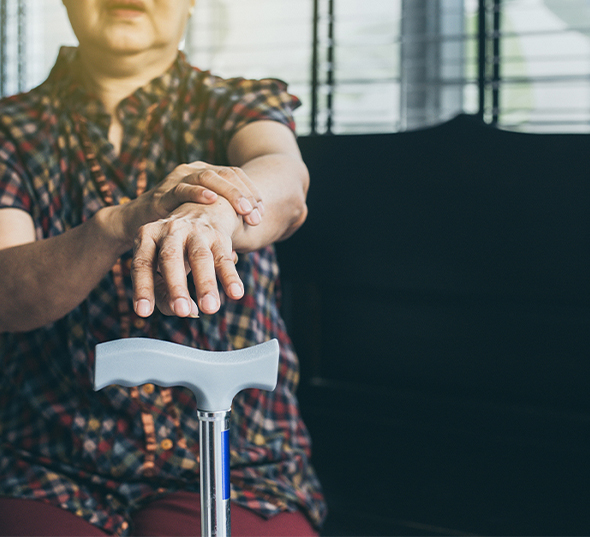
Arthritis

Helping you live independently with arthritis at all stages of the condition
Signs of arthritis

Types of arthritis
Osteoarthritis
The most common type of arthritis, osteoarthritis is most common in the hips, knees, spine and hands. It is the consequence of the protective cartilage wearing down. There is no way to cure osteoarthritis, however, is it possible to carefully manage the symptoms. Some of the ways to ensure the condition doesn’t worsen includes, ensuring a healthy weight is maintained and exercising. There are also treatments that can ease the pain of osteoarthritis. It is possible to live an independent life, and even work while suffering from osteoarthritis, with the right care and treatment.
How do you know if you have osteoarthritis?
There are some signs that you might be suffering from osteoarthritis. These include pain in the joints, especially after movement. Your joint might feel stiff, and in most cases, the symptoms are worse during periods of rest or first thing in the morning. When you touch the join, it may feel a little tender and you might not be as flexible as you were before. Inflammation of the area is also common, and this may result in some swelling in the affected area.
Rheumatoid Arthritis
Another common type of arthritis is rheumatoid arthritis, which is an inflammatory disorder affecting the joints. There are a range of problems associated with this type of arthritis, including damage to the skin, eyes and the lungs. Rheumatoid arthritis is an autoimmune disorder, which means there are issues with the immune system, as it attacks the tissues in the body. The consequences of this form of arthritis are the erosion of the bones and even joint deformity in some cases. There is treatment available to help control this condition, but unfortunately, if you are suffering from an extreme form of it, you could be susceptible to physical disabilities.
Fibromyalgia
Fibromyalgia causes pain across the whole body and although there is no known cause for it, it is thought that it could be a result of trauma such as a car accident or a fall. It can even be caused through high levels of stress. In some studies, it has even been discovered that a lack of deep sleep is common amongst fibromyalgia sufferers. There is a wealth of symptoms associated with fibromyalgia, making it quite difficult to diagnose, as the symptoms could be associated with many other illnesses. These include, pain, extreme tiredness, anxiety, lack of concentration, memory loss, and difficulty in sleeping. These symptoms can make it extremely difficult for sufferers to function properly, with many people unable to work as a result of severe symptoms.
Gout
Gout is another form of arthritis and it can appear without warning. Symptoms of gout include, pain and swelling and it usually occurs in the toe. The pain associated with gout may not be consistent, it might come and go. Some of the signs of gout include, intense joint pain, usually on the big toe, but it could also affect joints in the knees, elbows, wrists, fingers and ankles. The joints may red and inflamed, and it could also affect your ability to move the joint. It is thought that a poor diet may be a contributing factor to gout, and when this is improved, the gout may become less painful, and may even disappear completely.
Psoriatic Arthritis
Psoriatic arthritis often affects people that suffer from psoriasis. It is linked to the joints, causing them to feel painful, stiff and sometimes even swollen. It may get worse over time and could even cause permanent deformity. As long as it is treated early, the permanent damage may be avoided. Psoriatic arthritis may not be a constant issue, many sufferers find themselves dealing with regular flare ups. Medication can help with psoriatic arthritis.
Lupus
Lupus is a form of arthritis that causes joint pain, tiredness and sometimes even skin rashes. There is no treatment to get rid of lupus, although treatment can help to alleviate the symptoms. There are a range of symptoms associated with lupus, including muscle and joint pain, tiredness, and associated symptoms such as mouth sores, a high temperature and headaches. You may even experience hair loss as a result of lupus. A sensitivity light can be the cause of the rashes which can appear anywhere, but more often the nose and cheeks. The symptoms range from mild, such as joint and skin problems to moderate, which causes inflammation, and in serious cases, this could affect the heart and lungs, and therefore, becoming life threatening.
Our care service for adults and children with arthritis
At Harmony Healthcare, we aim to make your life more comfortable and enjoyable, and help you to live independently. No matter what age you are or how severe your condition is, we will create a care plan which is tailored to suit your needs. Our aim is to help you to live an independent life, regardless of how difficult it may seem. You may only require short-term care when you are going through a particularly bad flare-up or in some cases, you may need live-in support. If your family are looking after you, you may want some respite care to give your family members a much-needed break. We will talk you through the care plan, and adapt it to suit your capabilities. We deliver our care services in the comfort of your home, so that you can feel as relaxed as possible, while we deliver your support. We will always try to encourage you to do as many activities on your own as possible, while offering help when you need it.
Our arthritis care services for our clients
Our carers receive the highest form of nurse-led clinical training to ensure they can provide a quality care service to our clients receiving arthritis care. Working alongside other local authorities, they deliver a service in the comfort of the individual’s home, ensuring they are as comfortable as possible. They will also provide support and advice to families dealing with arthritis, helping to comfort them where required.
Case study: Living with arthritis
Moira had been working up until her 50’s, when she started getting symptoms such as difficulty sleeping, lack of energy and a generally low and irritable mood. She was diagnosed with fibromyalgia and the symptoms progressed to the point were she took early retirement at age 52. She gets episodes where the pain is so bad that she is unable to leave her bed, although the pain is not constant. She lives with her husband and her children (two teenagers) but they all work, so can’t always be there to support her. Her husband spoke to us about offering some kind of care at home, which could be adaptable to suit her condition. We provide both short term care when Moira is at her worst, which includes making meals, dressing her and doing shopping. Moira has started to view the carer as part of her family, and because she can rely on this support, she has started doing some freelance work from home, to help her keep busy.